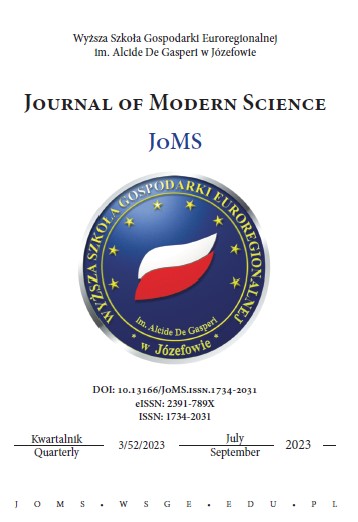SAMOTNOŚĆ W GRUPIE. ROZWAŻANIA NA TEMAT IZOLACJI, BRAKU RELACJI I POCZUCIU OSAMOTNIENIA W CZASIE COVID – 19 NA PRZYKŁADZIE BADAŃ PRZEPROWADZONYCH W WYŻSZEJ SZKOLE POLICJI W SZCZYTNIE
LONELINESS IN A GROUP. REFLECTIONS ON ISOLATION, LACK OF RELATIONSHIPS AND THE FEELING OF LONELINESS DURING COVID-19 PANDEMIC ON THE EXAMPLE OF RESEARCH CONDUCTED AT POLICE ACADEMY IN SZCZYTNO
Author(s): Iwona KlonowskaSubject(s): Social psychology and group interaction, Psychology of Self, Behaviorism, Health and medicine and law
Published by: Wydawnictwo Wyższej Szkoły Gospodarki Euroregionalnej im. Alcide De Gasperi w Józefowie
Keywords: Isolation; loneliness; Covid-19; Police academy in Szyczytno;
Summary/Abstract: The COVID-19 pandemic has affected the entire world. It has led to a change in interpersonal relationships, a loss of contact, and closing people to their homes. It has chenged the way people function, shifting most of their activities to the virtual space. This has resulted in feelings of loneliness, an increase in depressive behaviors, a sense of ostracism, and isolation. In this challenging environment, public and institutional schools had to adapt as well. Education in a new remote form or in a very limited direct form has translated into a sense of lack of coexistence with others. This article particularly focuses on the functioning of an institutional university, namely the Police Academy in Szczytno, during the COVID-19 pandemic. It examines the solutions adopted by the academy and the potential consequences felt by its students and staff. The COVID-19 pandemic changed the world, causing a unique pause in life and forcing people to stay at home. Teaching was moved into the virtual world, affecting the nature and quantity of interpersonal relationships. Most direct contacts had to be minimized or completely eliminated. The operation during COVID-19 was especially challenging for institutions like the Police Academy in Szczytno due to its specific nature, character, and the type of training and courses it offers. This necessitated the implementation of barracks-style accommodation without the possibility of leaving the academy's premises. For civilian students, classes were moved largely into the virtual space, while training and courses for police officers were carried out with barrack-style living conditions, reducing direct contact be-tween students to a maximum of 7 days when there was a break in training or in situations of increased infection rates. A significant challenge was the lack of an isolation facility in the Warmian-Masurian Voivodeship, forcing the academy to find its own solutions. It is important to note that the risk of infection at the Police Academy was high due to the substantial concentration of people in relatively small dormitory and educational buildings within the campus. At the time, there were over 1,300 students and more than 600 staff members on the premises.
Journal: Journal of Modern Science
- Issue Year: 52/2023
- Issue No: 3
- Page Range: 82-100
- Page Count: 19
- Language: Polish

